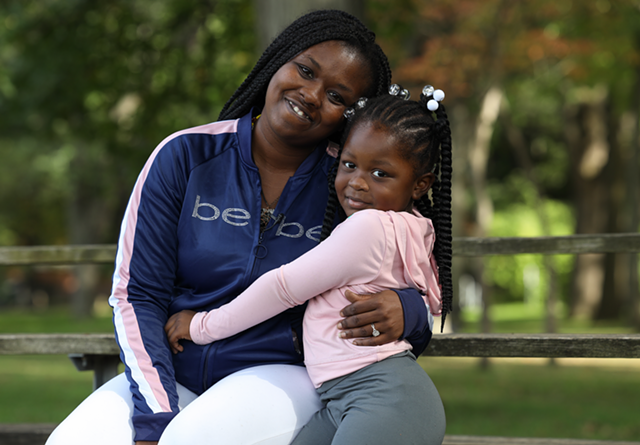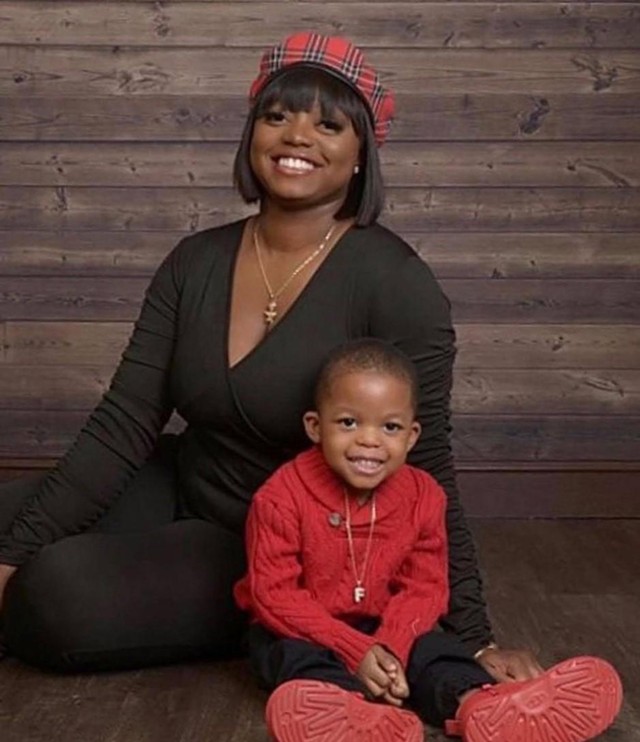Just days after delivering her daughter at Highland Hospital four years ago, Tashe Brown-Sanders was in so much pain that she had to go back to its emergency room.
“I told the doctor I'm in pain and he says, ‘Oh, you just had a baby.’ I'm like, ‘No, something's wrong,” Brown-Sanders said.
Doctors checked her blood pressure. It was skyrocketing.
Moments later, she flatlined.
“It came to the doctor smacking me on the face, and the nurse on the other side of me crying saying, ‘I thought I lost you. I thought I lost you,’” Brown-Sanders said.
She was suffering from post-partum preeclampsia – a potentially fatal condition that African American women are more at risk for, according to the National Institutes of Health. But Brown-Sanders said her troubles started in the beginning of her third trimester while getting prenatal care at a local public health clinic.
“I would be sleeping and I couldn't breathe,” Brown-Sanders said. “I would tell my doctor about it and she would say, ‘You’re fine.’”
Brown-Sanders ultimately demanded a stress test be performed on her baby. Doctors discovered that something was indeed wrong, and she was sent to the hospital to be induced.
According to a report by Common Ground Health, in the Finger Lakes region, Black women experience 50 percent more life-threatening delivery complications and maternal illnesses than white women. The report also states that in Monroe County, the Black infant mortality rate is more than three times the rate for white infants.
While efforts are underway to address these issues, there’s a long history of historical trauma to overcome.

“Throughout medical and nursing education, people just seem to think that Black women are just higher-risk by virtue of being Black,” said Tracy Webber, a registered nurse and the only Black midwife at University of Rochester Medical Center. “We're at higher risk of these issues by virtue of seeking health care in a system that does not serve us.”
Webber said for centuries, Black women endured forced pregnancies and experimental gynecological procedures. She said that not only affected the women getting the treatment, but also the health care system as a whole.
“The issue with that is it becomes learned behavior,” Webber said. “Then there's a framework that gets built upon that throughout history, on a subconscious level, that health care providers believe maybe Black women don't feel pain the same way that other women do.”
Webber said one of the ways to ensure Black pregnant women receive the medical and emotional support they need is by training more Black doulas.
Doulas get to know pregnant women and their families and advocate for them prenatally, during labor and delivery, and after the babies are born.
After experiencing two miscarriages, an ectopic pregnancy, and the premature birth of her son three years ago, Shai Davidson is now taking full advantage of the Black doula experience..
“I've tried to do it on my own and it just didn't work out,” Davidson said.
When she was 27 weeks pregnant, Davidson went to the hospital and asked for a cervical exam because of the pain she was experiencing.
“They told me it was gas, sent me home — told me I was fine, but the next day I felt my son drop,” said Davidson, whose son was ultimately delivered 10 weeks early.
Davidson is pregnant again, and she's hoping that with her doula by her side, she’ll have a less challenging experience this time.

“I know that when it's time, she's going to be right in the room speaking for me,” Davidson said, “It makes me feel secure.”
U.S. Senate Majority Leader Chuck Schumer and New York State Attorney General Letitia James are pushing for more Black pregnant women to have access to that kind of care.
“We care about it, it’s getting a lot of support, and I’m fighting hard to get it done,” Schumer said about his newly proposed Black Maternal Health Momnibus Act of 2021. The bill includes increased Medicaid benefits to cover doulas and midwives, and funding various community-run organizations that help address racial health and birth disparities among minorities.
The Momnibus Act also addresses social, nonmedical factors that contribute to the Black health crisis, such as poverty and prejudice.
“I think everybody is filling in their own circles and doing wonderful work and having important conversations, but at some point, we need to come together,” Webber said.
She said the only way to end this cycle of mistreatment is for mothers, doctors, advocates, and legislators to join forces.
“I told the doctor I'm in pain and he says, ‘Oh, you just had a baby.’ I'm like, ‘No, something's wrong,” Brown-Sanders said.
Doctors checked her blood pressure. It was skyrocketing.
Moments later, she flatlined.
“It came to the doctor smacking me on the face, and the nurse on the other side of me crying saying, ‘I thought I lost you. I thought I lost you,’” Brown-Sanders said.
She was suffering from post-partum preeclampsia – a potentially fatal condition that African American women are more at risk for, according to the National Institutes of Health. But Brown-Sanders said her troubles started in the beginning of her third trimester while getting prenatal care at a local public health clinic.
“I would be sleeping and I couldn't breathe,” Brown-Sanders said. “I would tell my doctor about it and she would say, ‘You’re fine.’”
Brown-Sanders ultimately demanded a stress test be performed on her baby. Doctors discovered that something was indeed wrong, and she was sent to the hospital to be induced.
According to a report by Common Ground Health, in the Finger Lakes region, Black women experience 50 percent more life-threatening delivery complications and maternal illnesses than white women. The report also states that in Monroe County, the Black infant mortality rate is more than three times the rate for white infants.
While efforts are underway to address these issues, there’s a long history of historical trauma to overcome.

- PHOTO BY MAX SCHULTE
- Tashe Brown-Sanders with daughter Wynter whom she delivered just days before she flatlined after suffering from post-partum preeclampsia.
“Throughout medical and nursing education, people just seem to think that Black women are just higher-risk by virtue of being Black,” said Tracy Webber, a registered nurse and the only Black midwife at University of Rochester Medical Center. “We're at higher risk of these issues by virtue of seeking health care in a system that does not serve us.”
Webber said for centuries, Black women endured forced pregnancies and experimental gynecological procedures. She said that not only affected the women getting the treatment, but also the health care system as a whole.
“The issue with that is it becomes learned behavior,” Webber said. “Then there's a framework that gets built upon that throughout history, on a subconscious level, that health care providers believe maybe Black women don't feel pain the same way that other women do.”
Webber said one of the ways to ensure Black pregnant women receive the medical and emotional support they need is by training more Black doulas.
Doulas get to know pregnant women and their families and advocate for them prenatally, during labor and delivery, and after the babies are born.
After experiencing two miscarriages, an ectopic pregnancy, and the premature birth of her son three years ago, Shai Davidson is now taking full advantage of the Black doula experience..
“I've tried to do it on my own and it just didn't work out,” Davidson said.
When she was 27 weeks pregnant, Davidson went to the hospital and asked for a cervical exam because of the pain she was experiencing.
“They told me it was gas, sent me home — told me I was fine, but the next day I felt my son drop,” said Davidson, whose son was ultimately delivered 10 weeks early.
Davidson is pregnant again, and she's hoping that with her doula by her side, she’ll have a less challenging experience this time.

- PROVIDED
- Shai Davidson and her son, Frederick Greggs Jr whom she delivered 10 weeks early.
“I know that when it's time, she's going to be right in the room speaking for me,” Davidson said, “It makes me feel secure.”
U.S. Senate Majority Leader Chuck Schumer and New York State Attorney General Letitia James are pushing for more Black pregnant women to have access to that kind of care.
“We care about it, it’s getting a lot of support, and I’m fighting hard to get it done,” Schumer said about his newly proposed Black Maternal Health Momnibus Act of 2021. The bill includes increased Medicaid benefits to cover doulas and midwives, and funding various community-run organizations that help address racial health and birth disparities among minorities.
The Momnibus Act also addresses social, nonmedical factors that contribute to the Black health crisis, such as poverty and prejudice.
“I think everybody is filling in their own circles and doing wonderful work and having important conversations, but at some point, we need to come together,” Webber said.
She said the only way to end this cycle of mistreatment is for mothers, doctors, advocates, and legislators to join forces.

